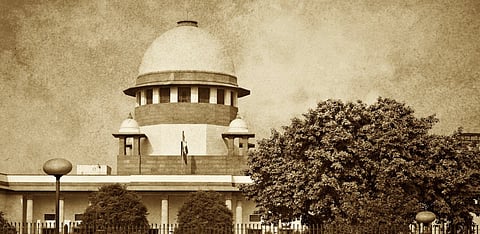

The constitutional validity of the Places of Worship (Special Provisions) Act, 1991 is under challenge for being arbitrary and irrational. In today's hearing, the Supreme Court has sought a reply from the Union government.
—
ON Tuesday, the Supreme Court directed the Union government to file its reply to a batch of petitions challenging the constitutional validity of the Places of Worship (Special Provisions) Act, 1991 at the latest by October 31, 2023.
The court also clarified that pendency of the petitions does not put a bar on the operation of the 1991 Act.
The petitions came up for hearing today before a Bench comprising Chief Justice of India(CJI) D.Y. Chandrachud and Justices P. S Narasimha and Manoj Mishra.
Bharatiya Janata Party (BJP) leader Dr Subramanian Swamy, who is one of the petitioners, complained to the Bench about the government asking for adjournment repeatedly. The CJI responded, "Let them file the counter and then we can proceed."
The petitions were last heard on April 5 this year, when the court directed the Union government to file its reply before July 11.
Advocate Vrinda Grover, for Jamiat Ulema-i-Hind, urged the Bench to issue notice on an application seeking proper enforcement of the 1991 Act.
In March 2021, a Bench comprising the then CJI S.A. Bobde and Justice A.S. Bopanna issued notice to the Union Government on a public interest litigation filed by BJP leader and advocate Ashwini Upadhyay, challenging the constitutional validity of the 1991 Act.
In his plea, Upadhyay contends that the 1991 Act took away the rights of Hindus, Jains, Buddhists and Sikhs to restore their places of worship which were destroyed by "barbaric invaders".
The plea adds that the 1991 Act excluded the birthplace of Lord Rama but included the birthplace of Lord Krishna, though both are considered the incarnation of Lord Vishnu and are equally worshipped among Hindus. It is stated under the plea that the 1991 Act is, therefore, arbitrary and irrational.
The plea further states that Hindus, Jains, Buddhists and Sikhs had suffered from 1192 CE to 1947 CE.
"The question is whether even after [India's] independence, they cannot seek judicial remedy to undo the barbarian acts through processes of court to establish that law is mightier than the sword.
"The Act affects the right to religion of Hindus and snubs their voice against illegal, inhumane barbarian action committed in the pre-independence period," the petition reads.
The 1991 Act was enacted by the Parliament to prohibit the conversion of any place of worship and to preserve the religious character of any place of worship as it existed on August 15, 1947.
A five-judge Constitution Bench of the Supreme Court, in its Ayodhya judgment, said that the 1991 Act protected and secured the fundamental values of the Constitution. In the judgment, the Bench observed:
"The State has, by enacting the law, enforced a constitutional commitment and operationalised its constitutional obligations to uphold the equality of all religions and secularism which is a part of the basic features of the Constitution.
"The Places of Worship Act imposes a non-derogable obligation towards enforcing our commitment to secularism under the Indian Constitution. The law is hence a legislative instrument designed to protect the secular features of the Indian polity, which is one of the basic features of the Constitution.
"In providing a guarantee for the preservation of the religious character of places of public worship as they existed on August 15, 1947 and against the conversion of places of public worship, the Parliament determined that independence from colonial rule furnishes a constitutional basis for healing the injustices of the past by providing the confidence to every religious community that their places of worship will be preserved and that their character will not be altered," the judgment reads.
Pertinently, the 1991 Act exempts from the application of its provisions the Ram Janmabhoomi–Babri Masjid site in Ayodhya, and all suits, appeals or proceedings related to it.